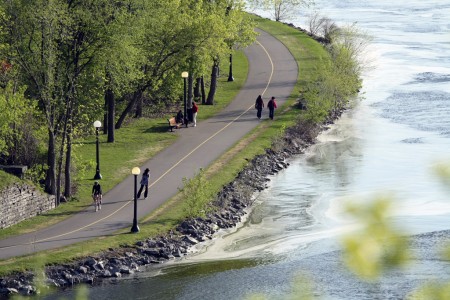
Seen from a simplistic and very selfish human perspective, ecosystems are devices for converting sunlight into human food. Sometimes, this happens fairly directly: sun hits soybean leaves, soybeans grow, and people eat them. In the case of the fish we eat, it is generally much less direct: sun hits phytoplankton, zooplankton eats that, they get eaten by fish that can eaten by successively larger fish, finally the largest fish get caught and eaten by us. In at least one important sense, this pyramid of energy use is quite different from the terrestrial one. In terrestrial agriculture, we manage the initial sun collection and can increase its amount in various ways. We are not, and perhaps never can be, farmers of plankton at the scale necessary to sustain the global marine food web. The effort involved in boosting the global plankton supply significantly would presumably be very large, given the immense biomass involved. Also, since energy is lost in each conversion, the amount of additional high-level species that would result from any increase would be smaller than the amount of additional plankton generated.
We are seriously overfishing the stocks that depend on the energy from existing phytoplankton stocks. If we start growing tuna and salmon in farms, feeding them fish from progressively lower in the marine ecosystem, we will eventually hit the bottom (if we keep having enough fuel for all those fishing boats). It is a fallacy to think that fish farms are like livestock farming on land. In the latter case, we are responsible for providing the inputs. In the former, we are still gathering from natural ecosystems, and doing so at an unsustainable rate.
Two partial solutions seem to exist. Firstly, we can get more fish per person by eating more plentiful species with lower trophic levels (closer to being creatures that eat plankton). That means anchovies for dinner, rather than tuna. Secondly, we could conceivably feed fish in farms using food from the land. That allows us to increase the basic solar energy being collected, and sustain a larger amount of tasty fish as a result. Of course, extending land-based agriculture entails other financial and environmental costs. Not least among these are the marine dead areas produced by pollution and fertilizer runoff.
The sensible way to run global fisheries is to avoid activities that cause disproportionate harm (dynamite fishing, catching juvenile fish) and then eat the sustainable portion of the output from different trophic levels. This means basically accepting a total level of sustainable human fish consumption for different species, then resisting political and financial pressures to exceed that limit. Of course, the record of human societies on doing this is dismal. We basically only fish sustainably when we are physically incapable of fishing more. Partly as a result of that, the general outlook for the world’s marine fisheries is dire.









